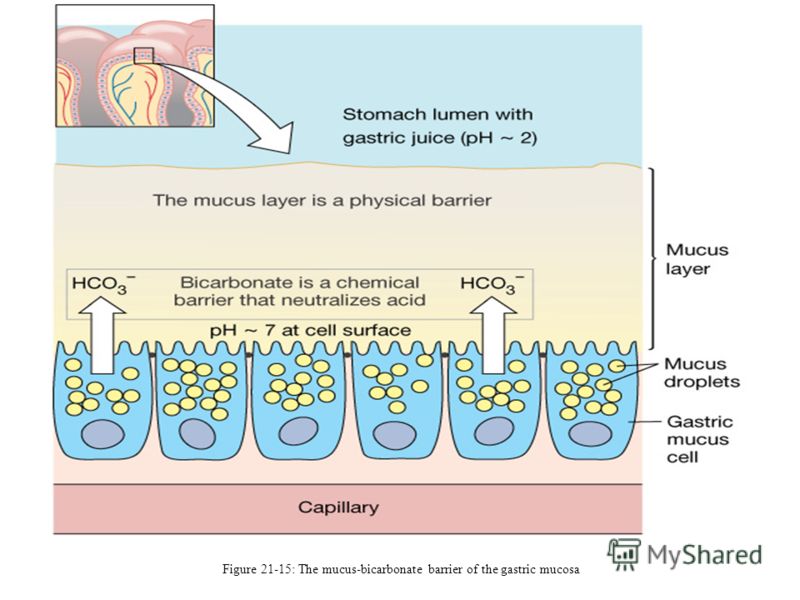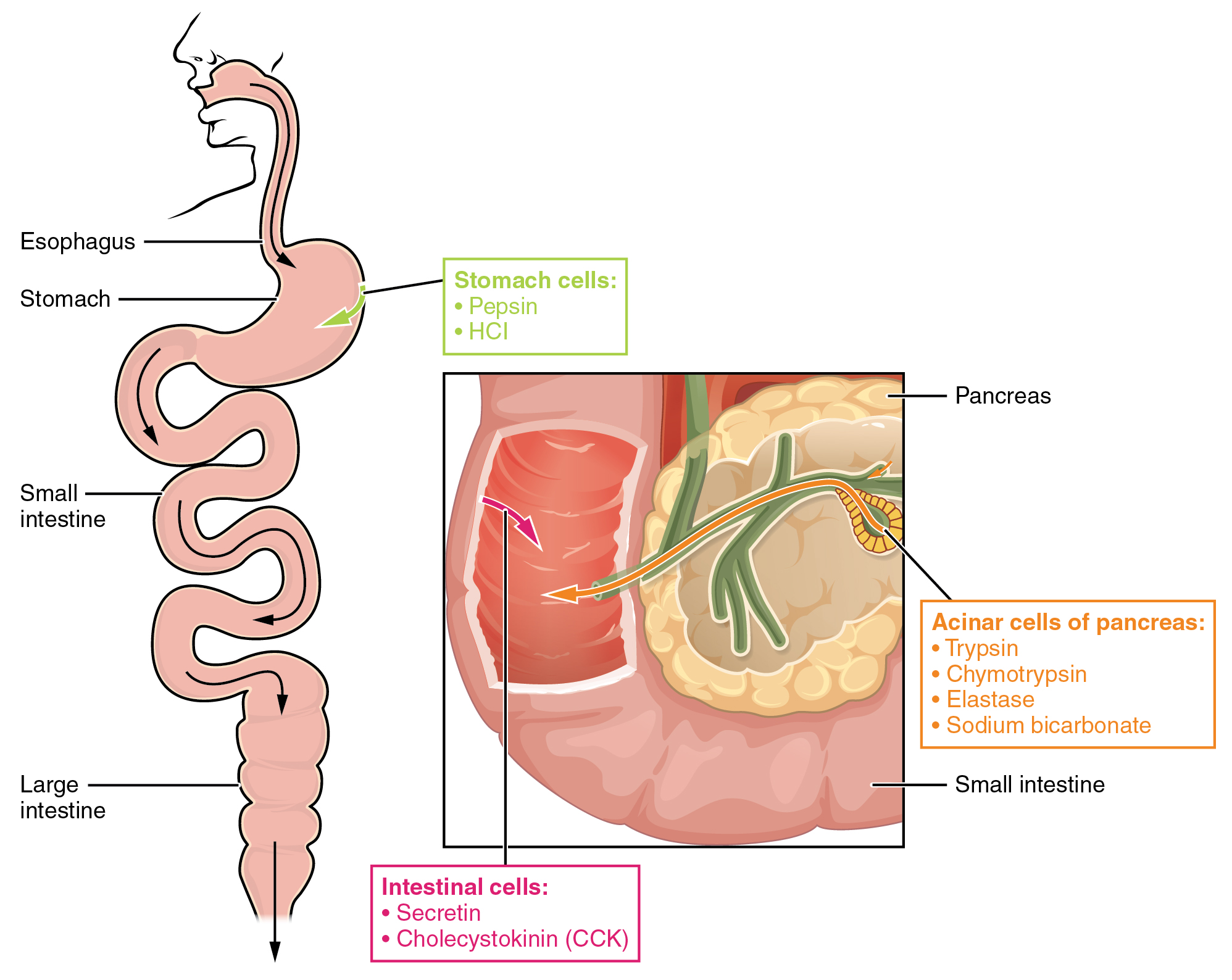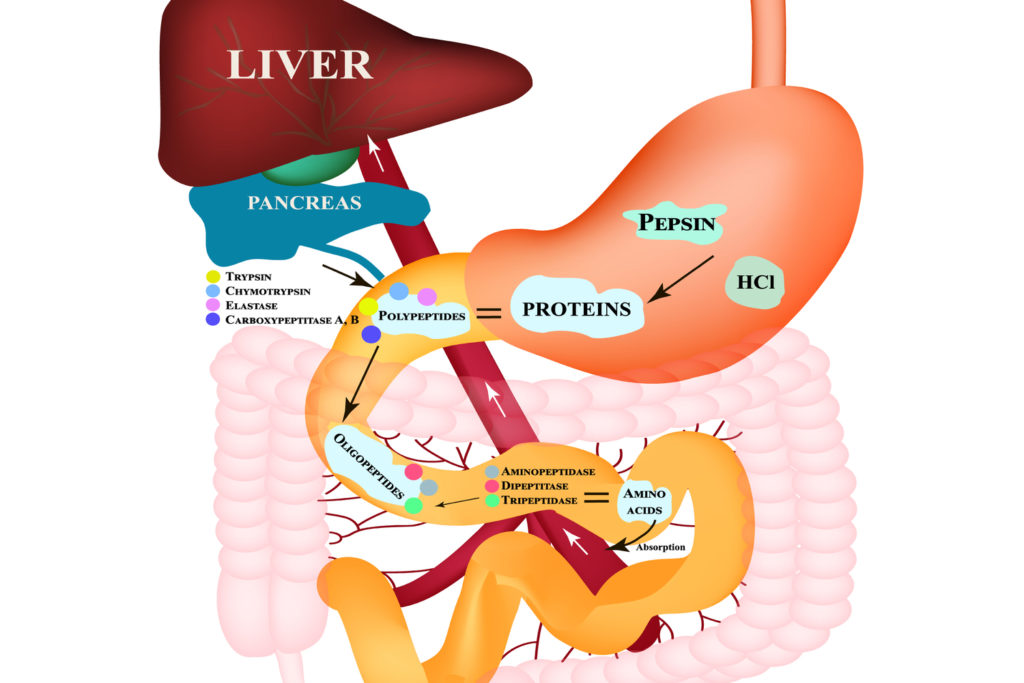These Cells Produce Pepsin Which Breaks Down Proteins
Chief cells in the stomach secrete pepsin to help you digest or breaks down proteins into smaller compounds called peptides. When an amino acid is digested it produces a peptide.

Human Digestive System Medical Knowledge Nursing School Tips Nursing School Notes
Pancreas This organ produces enzymes that break down nutrients.

. In addition to proteases bacteria in your gut can also break down proteins. Pepsin helps break down proteins into smaller peptides. Want this question answered.
Of these five components pepsin is the principal enzyme involved in protein digestion. These cells produce pepsin which breaks down proteins. Pepsin is a stomach enzyme that aids in the digestion of proteins in food.
In fact pepsin is only produced in your stomach. It is also an exopeptidase that digests peptides an amino acid. If pepsin is found in other parts of the body eg in saliva or sputum samples the only mechanism by which that would be possible is.
Capillaries These tiny blood vessels transport absorbed nutrients. Click to see full answer. Pepsin was first recognized in 1836 by the German physiologist Theodor Schwann.
Be notified when an answer is posted. Pepsin is an endopeptidase that initiates the process of protein digestion in the stomach. Pepsin from the Greek Pepsis meaning digestion.
Chief Cells These cells produce pepsin which breaks down proteins. Capillaries These tiny blood vessels transport absorbed nutrients. These cells produce hydrochloric acid HCl.
A low pH 15 to 2 activates pepsin. It is also a protease. Pepsin is the chief digestive enzyme in the stomach that breaks down proteins.
The pancreas produces pepsin mainly in two different areas. Now it is time to design and build your own digestive system. Pepsin action results in the release of small peptides and amino acids peptones that as noted above stimulate the release of gastrin from antral G cells.
The cells that produce pepsin an enzyme that breaks down proteins during the digestive process is Chief cells. THIS SET IS OFTEN IN FOLDERS WITH. Hydrochloric acid is secreted by parietal cells in the stomach lining which lowers the pH of the stomach.
Subsequently one may also ask how does pepsin break down a. Capillaries These tiny blood vessels transport absorbed nutrients. We see that chief cells produce pepsinogen an inactive form of pepsin.
Peptein to digest is a digestive endoprotease of gastric juice. Pepsin is secreted by gastric chief cells as pepsinogen an inactive zymogen. Parietal Cells These cells produce hydrochloric acid HCl.
Pepsin is produced by the chief cells and is turned into pepsinogen by the hormone gastrin produced in the brain. Pancreas This organ produces enzymes that break down nutrients. Pepsin is the main digestive enzyme in the stomach that breaks down proteins.
Pepsinogen helps break down proteins in your stomach. Pepsin is produced by the chief cells in the inactive form pepsinogen which is then converted to pepsin by the hydrochloric acid from the parietal cells. Pepsin is the mature active form of the zymogen inactive protein pepsinogen.
Specific cells within the gastric lining known as chief cells release pepsin in an. What cells produce pepsin which breaks down proteins. Now it is time to design and build your own digestive system.
Parietal Cells These cells produce hydrochloric acid HCl. The chief cells produce and secrete pepsinogen which is the precursor to the proteolytic enzyme pepsin. Pepsin a protease enzyme breaks down proteins into smaller peptides.
Pepsin is a digestive enzyme that is used to digest proteins. The parietal cells secrete hydrochloric acid and intrinsic factor whereas the mucus-secreting cells secrete mucin. These cells produce hydrochloric acid HCl.
Pepsin the powerful enzyme in gastric juice that digests proteins such as those in meat eggs seeds or dairy products. The pancreas also releases pepsin into the pancreatic duct which then connects to the common bile duct. Now it is time to design and build your own digestive system.
These peptones also stimulate CCK release from duodenal I cells. These include the parietal cells chief cells mucus-secreting cells and hormone-secreting cells. Proteases are enzymes that help in protein digestion.
Parietal cells within the stomach lining secrete hydrochloric acid that lowers the pH of the stomach. These cells produce pepsin which breaks down proteins. Pepsin Enzyme breaks down proteins in the bolus by hydrolyzing peptide bonds before aromatic and hydrophobic amino acids.
Gastric chief cells secrete pepsin as an inactive zymogen called pepsinogen. These cells produce pepsin which breaks down proteins. Chief Cells These cells produce pepsin which breaks down proteins.
It is produced in the chief cells of the stomach lining and is one of the main digestive enzymes in the digestive systems of humans and many other animals where it helps digest the proteins in food. Gastric juice comprises water mucus hydrochloric acid pepsin and intrinsic factor. Pepsin is activated by a.
Pepsin is an enzyme from the animal kingdom discovered by Dr. Pepsin is a stomach enzyme that serves to digest proteins found in ingested food. Chief Cells These cells produce pepsin which breaks down proteins.
These amino acids can be absorbed by intestinal cells and used by your body for growth repair and maintenance. Pepsin is an enzyme that breaks down proteins. It breaks down proteins into smaller peptides and amino acids that can be easily absorbed in the small intestine.
The pancreas releases pepsin into the pancreatic duct which leads to the pancreas. How many fat Calories were converted to fatty acids when the pancreas was moved over to the right and the gallbladder was placed on the esophagus right before the pancreas. Pepsin is an endopeptidase that breaks down proteins into smaller amino acids.
Pepsinogen is converted to pepsin when the parietal cells found within the gastric glands secrete hydrochloric acid. Pepsin is produced in the pancreass exocrine part. Pancreas This organ produces enzymes that break down nutrients.
Bacteria present in large numbers in the colon can produce enzymes that break down proteins into amino acids. What cells produce pepsin which breaks down proteins. Parietal Cells These cells produce hydrochloric acid HCl.

25 3 Digestive System Processes Texas Gateway
Anatomy Of Organs Of The Digestive System And Their Functions Bio103 Human Biology

Pepsinogen I An Overview Sciencedirect Topics

If The Proteases Such As Pepsin And Trypsin Digest Protein Why Don T They Digest The Stomach And Small Intestine Since The Stomach And Small Intestine Are Both Made From Protein Socratic

Digestion Part Ii Ppt Download
Would Pepsin Function In The Small Intestine And Would Trypsin Function In The Stomach Why Or Why Not Quora

Digestive System Diagram Quizlet

3 3 3 Digestion And Absorption Flashcards Quizlet

Pin By Alexis Bristol On Bio Biology Notes Medical School Inspiration Biology Revision

Digestive System Facts Cool Kid Facts Digestive System Diagram Digestive System Digestion

Are Piles And Hemorrhoids The Same Hemorrhoids Hemorrhoids Treatment Plexus Products

Sodium Glucose Transport Proteins Sglt Take Up Glucose And Galactose And Transport Them To The Ecf Some Glucose Is Bad Carbohydrates Carbohydrates Digestion

Signs You Need This Vital Enzyme How To Get It Digestive Enzymes Enzymes Gastric Juice

Protein Metabolism Anatomy And Physiology

Digestive Enzymes Human Digestive System Digestive Enzymes Biology Lessons

Digestive System Humans As Heterotrophs Hetero Another Trophe Nutrition As Heterotrophs We Cannot Create Carbon Therefore We Need To Ingest Carbon Ppt Download

What Is The Function Of The Pepsin Enzime By Nadya Michelle Castillo Morales

What Is Pepsin And How Does It Benefit Digestion Fresh N Lean

Comments
Post a Comment